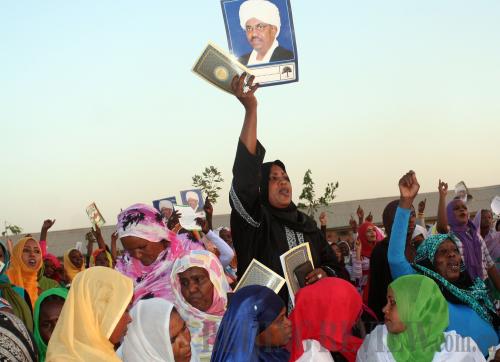|
 |
|
VICTORIOUS: In April, incumbent Sudanese President Omar al-Bashir was declared the winner of the country's first multi-party general elections with 68 percent of the vote (XINHUA) |
In April, incumbent Sudanese President Omar al-Bashir was declared the winner of the country's first multi-party general elections with 68 percent of the vote. It indicates that a national unity government will be established by al-Bashir's National Congress Party and the Sudan People's Liberation Movement (SPLM), and al-Bashir will have to face a series of severe challenges at home and abroad.
● A separatist movement in Southern Sudan and the Darfur issue. Under the terms of the Comprehensive Peace Agreement signed between the Sudanese Government and SPLM in 2005, a referendum on independence for the south is slated to be held in 2011. Although the Sudanese Government has always committed to a peace process between North and South Sudan, it faces uncertainty over whether it could maintain national unity under such an accord.
The 10 states of Southern Sudan account for a quarter of Sudan's total land mass and one fifth of its total population. Southern Sudan is also rich in oil, gold and water resources. Once any big event takes place there, Sudan's political map will undergo significant changes that will further trigger the political instability. The country will also suffer in terms of valuable material and human resources.
And while the current situation in Darfur is gradually calming down, the causes of that conflict have yet to be resolved. Once the situation changes, the old contradictions will once again trigger new conflicts. Particularly, once Southern Sudan declares independence it could exert a negative effect on the region of Darfur, forming a severe potential danger for Sudan's unification and political development.
●Sudan's national identity and social integration. Sudan is a multi-ethnic and multi-religious country. It comprises 19 ethnic groups and nearly 600 tribes. Across the country, blacks, Arabs and Bejas account for 52 percent, 39 percent and 6 percent of the population respectively. Some 70 percent of the Sudanese are adherents of Islam, 25 percent are from indigenous tribal religions and fetishism, and 5 percent are Christians.
The long civil war and political instability have not only damaged Sudan's social and economic development, but also weakened its national identity and ability to function as a nation state. Consequently, over more than half a century after independence, Sudan has not completed its national state building and social integration.
Thus al-Bashir's administration faces a series of inevitable challenges in a bid to enhance national cohesion: the establishment of national sovereignty, effective political and legal order and citizens' national identity, the effective distribution of social resources and wealth, and the protection and expansion of citizens' political, social and economic rights.
● Maintaining political stability while developing the national economy. The recent elections are widely recognized a major step forward in the country's democracy progress. However, if Sudan wants to continue to promote its democracy agenda and achieve a higher degree of democracy, it must develop its national economy while maintaining political stability.
Although the Sudanese economy in recent years has made some progress, it is still a long way off from poverty. Currently, it remains one of the least-developed countries in Africa and Sudan has yet to fully resolve even the basic problem of food self-sufficiency despite its vast land resources. In this sense, the development of the national economy not only remains the root of maintaining political independence, but also propels social progress.
●Appropriate use of authority on its path to democracy. The autocracy is bound to be totally abandoned during the development of human society. Any effective democratic system must be built on a solid foundation, which cannot be done overnight. Otherwise, the ineffective democratic system will leave a country in chaos, for example of today's Iraq. And once a nation state is founded, it requires a stable political, social and economic environment with which to safeguard national unity, while keeping a balance among domestic forces.
Thus the reality in the Middle East and Africa, especially Sudan, has proven that the appropriate use of authority is indispensable. The appropriate authority will ensure Sudan's peace and development to achieve higher degree of democracy.
●Pressure from United States. The relations between Sudan and the United States have long been strained. As early as in 1993, the United States labeled Sudan a state sponsor of terrorism. In 1997, the United States placed economic sanctions on Sudan and attacked a pharmaceutical plant in 1998, claiming it was involved in the production of prohibited chemical weapons. In recent years, the United States along with other Western countries have continued to apply pressures on the Sudanese Government due to Darfur issue.
The Hague International Criminal court in 2009 issued arrest warrant for al-Bashir for war crimes and crimes against humanity in Darfur. However, al-Bashir and its National Congress Party's victory in the elections is the choice made by the Sudanese people. Everyone should respect that choice. Elections victory will not lead to the changes in the United States and other Western countries' policies toward Sudan, while it will consolidate al-Bashir and its National Congress Party's position in Sudan.
Last year, U.S. President Barack Obama told the UN General Assembly, "Democracy cannot be imposed on any nation from the outside. Each society must search for its own path, and no path is perfect. Each country will pursue a path rooted in the culture of its people, and in its past traditions." His statement is brilliant, but he must show that he means it.
But regardless of politics or social and economic development, the Sudanese people will continue to seek the path that is most appropriate for them.
The author is director of the Division of Middle East Studies at Institute of West Asian and African Studies of the Chinese Academy of Social Sciences |